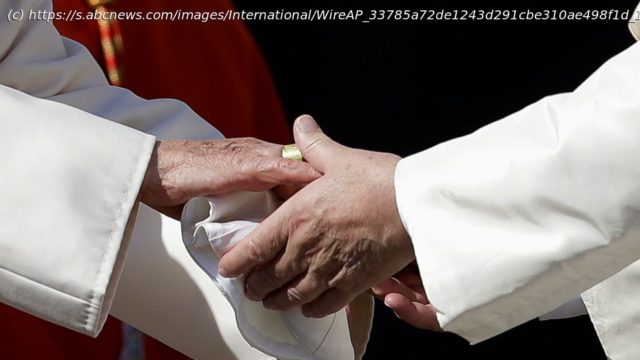Array
If ever there was a moment that embodied the surreal novelty created by the first papal resignation in 600 years, it came on the morning of March 23, 2013: Newly elected Pope Francis had traveled to the papal summer retreat south of Rome and was greeted on the helipad by the previous pope, Benedict XVI, who had moved there three weeks earlier.
Two men in white — a reigning pope and a retired one — each showing the other the deference owed to a pontiff and discussing the future of the Catholic Church as it passed from one papacy to the next.
But for some, that moment on the helipad of Castel Gandolfo encapsulated everything that was wrong with Benedict’s surprise resignation and the risks it posed to the very unity of the Catholic Church and the institution of the papacy.
For these critics, Benedict’s decision to retire at age 85 rather than die on the job created the specter of two leaders of the 1.3 billion-member Catholic Church, with the old pope remaining a point of reference for traditionalists who opposed the new pope and refused to recognize his legitimacy.
For a church that prides itself on unity, believes in the singular primacy of the pope and considers the pontiff the divinely inspired successor of the Apostle Peter, any confusion over who’s really in charge is not a small thing.
“Such situations could lead to a schism,” German Cardinal Walter Brandmueller warned soon after that March meeting.
Any confusion ended on Saturday, when Benedict died at his home in the Vatican Gardens at age 95. Francis will celebrate his funeral Mass on Thursday, creating a novelty for the church: that of a reigning pope eulogizing a retired one.
From the title he chose (pope emeritus) to the cassock he wore (white) to his occasional public comments (on sex abuse and priestly celibacy), Benedict’s post-retirement decisions sparked calls for the Vatican to develop rules and regulations to guide future popes who might follow in his footsteps and quit.
Even Francis weighed in, saying a decade into Benedict’s experiment that regulations would be needed in the future. Things had worked out well enough in Benedict’s case because he was “saintly and discreet,” Francis said.
The Jesuit pope, for the record, said that if he were to retire, he would be known as the “bishop emeritus of Rome,” not “pope emeritus” and would live somewhere in Rome, not the Vatican or his native Argentina.
But Francis couldn’t craft any protocols governing a future retired pope while Benedict was still alive, creating a situation of uncertainty and unease about the status quo that particularly riled Benedict’s firmest supporters. Now that Benedict has died, the Vatican might be in a better position to draft such regulations.
“I hope we don’t have any or many retired popes, but if it was to continue, church law needs to develop a set of protocols,” said Australian Cardinal George Pell, an ardent Benedict supporter who nevertheless opposed his decision to resign.
“As it has become more and more apparent, church unity can never be taken for granted,” Pell said in a 2021 interview, noting the nostalgia among some traditionalists for Benedict’s doctrinaire papacy.






